Заполните пропуски глаголом to have в соответствующей форме max a ford two years ago
II. Заполните пропуски подходящей формой глагола to have в Present, Past
II. Заполните пропуски соответствующей формой глагола to have в Present, Past или Future Simple.
1. I a cat and a dog.
2. My father a hobby gardening.
3. We a holiday dinner yesterday.
4. Next week she several very important exams.
5. They a good English teacher when they studied at the University.
III. Раскройте скобки и поставьте глагол в соответствующую форму Present Simple. Переведите предложения на русский язык.
1. In Britain the banks usually (to open) at 9.30. in the morning.
2. Water (to boil) at 100 degrees Celsius.
3. Children always (to like) chocolate.
4. Margaret (to speak) four languages.
5. The City Museum (to close) at 5 oclock in the evening.
6. I (to study) at the University.
IV. Раскройте скобки и поставьте глагол в подходящую форму Present Continuous. Переведите предложения на российский язык.
1. Please be quiet! I (to work).
2. We (to discuss) very important questions ay the moment.
3. Where is Ann? She (to have) a shower.
4. Hurry up! Your friends (to wait) for you!
5. What are you doing? I (to cook).
V. Раскройте скобки и поставьте глаголы в Present Simple либо Present Continuous.
1. My father (to drink) tea now, but usually he (to drink) coffee in the morning.
2. On Sundays we (to play) tennis, but now we (to play) football.
3. My daughter (to do) her homework at the moment.
4. She always (to do) her homework in the evening.
5. Peter (to speak) over the phone now.
6. Sometimes he (to speak) over the phone more than an hour.
VI. Напишите форму Past Simple для следующих глаголов.
1. to be 5. to ask 9. to smoke
2. to do 6. to answer 10. to come
3. to write 7. to study 11. to watch
4. to make 8. to take 12. to sleep
VII. Подчеркните сказуемое, стоящее в Past Continuous, переведите предложение на российский язык.
1. When I came home, my family was having dinner.
2. Yesterday the whole evening she was preparing for her exams.
3. My best friend phoned me, when I was going to the University.
4. Father was repairing a TV set all day long yesterday.
5. The students were translating the text, when the teacher entered the class.
VIII. Поставьте сказуемое предложений во Future Simple Tense.
1. I (to study) at the University next year.
2. We (to play) hockey in winter.
3. Im sure they (to wait) for us.
4. Our next lesson (to be) on Tuesday.
5. We hope she (to come) back from the USA soon.
6. She (to call) when she finishes her homework.
IX. Подчеркните сказуемое, стоящее во Future Continuous, переведите предложения на российский язык.
1. My friend and I will be doing shopping all day long tomorrow.
2. I cant give you my computer. Ill be using it tomorrow.
3. Well be discussing these questions tomorrow morning.
4. When I come home in the evening, my wife will be cooking supper.
5. Dont come to me on Monday. Ill be preparing for a job interview.
- Валентина Снулова
- Английский язык
- 2019-01-19 10:30:27
- 3
- 2
1. have
2. has
3. had
4. will have
5. had
III
1. In Britain the banks usually open at 9.30 in the morning -в Британии банки раскрываются в 9:30 днем.
2. Water boils at 100 degrees Celsius. Вода бурлит при 100 градусах по Цельсию.
3. Children always like chocolate- малыши всегда обожают шоколад.
4. Margaret speaks four languages.Маргарет беседует на 4 языках
5. The City Museum closes at 5 oclock in the evening.Городской музей (но
лучше так и говорить The City Museum) запирается в 5 часов вечера.
6. I study at the University. Я учусь в университете.
IV
1. Please be quiet! Im working. Пожалуйста,тише!Я работаю.
2. We are discussing very important questions at the moment.Мы обговариваем очень главные вопросы на данный момент(на данный момент)
3. Where is Ann? She is having a shower. Где Аня? - Она воспринимает душ.
4. Hurry up! Your friends are waiting for you! Быстрей! Твои друзья ожидают тебя!
5. What are you doing? Im cooking Что ты делаешь? Я готовлю.
V
1. My father is drinking tea now, but usually he drinks coffee in the morning.
2. On Sundays we play tennis, but now we are playing football.
3. My daughter is doing her homework at the moment.
4. She always does her homework in the evening.
5. Peter is speaking over the phone now.
6. Sometimes he speaks over the phone more than an hour.
VI
1. was/were
2. did
3. wrote
4. мейд
5. asked
6, answered
7. studied
8. took
9. smoked
10. came
11. watched
12. slept
VII.
1. When I came home, my family was having dinner. Когда я пришел домой, моя семья обедала
2. Yesterday the whole evening she was preparing for her exams. Вчера весь вечер она приготовлялась к экзаменам.
3. My best friend phoned me, when I was going to the University. Мой наихороший друг позвонил мне, когда я собиралась в университет.
4. Father was repairing a TV set all day long yesterday. Папа чинил телек весь вчера.
5. The students were translating the text, when the teacher entered the class. Студенты переводили текст, когда учитель вошел в класс.
VIII
1. I will study at the University next year.
2. We will play hockey in winter.
3. Im sure they will wait for us.
4. Our next lesson will be on Tuesday.
5. We hope she will come back from the USA soon.
6. She will call when she finishes her homework.
IX.
1. My friend and I will be doing shopping all day long tomorrow. Я с приятелем будем закупаться весь денек завтра.
2. I cant give you my computer. Ill be using it tomorrow. Я не могу дать для тебя собственный компьютер, я буду воспользоваться им завтра.
3. Well be discussing these questions tomorrow morning. Мы обсудим эти вопросы завтра с утра.
4. When I come home in the evening, my wife will be cooking supper. Когда я пришел домой вечерком, моя жена готовила ужин.
5. Dont come to me on Monday. Ill be preparing for a job interview. Не ходи ко мне в пн. Я буду приготовляться к деловому интервью.
Глагол to have в английском языке
Как самостоятельный глагол to have в настоящем времени имеет 2 формы:
have для всех лиц, кроме 3-го лица единственного числа
hasдля 3-го лица единственного числа
You have They have
В прошедшем времени глагол to have имеет форму had, в будущем - shall have, will have.
Значение этого глагола - "иметь, владеть, обладать". Часто в разговорной речи вместо have, has употребляется словосочетание have got, has got (краткие формы 've got и 's got) с тем же значением, особенно когда речь идёт о временном владении или только что приобретённом предмете или предметах:
Примеры:
We've got a nice flat.
Have you got any pets?
В вопросительной форме в британском варианте языка глагол to have часто стоит перед подлежащим, в американском варианте вопросительная и отрицательная формы всегда образуются с помощью вспомогательного глагола do:
Примеры:
Have you two sons? (брит.)
Do you have a lot of free time? (амер.)
Отрицание выражается формой глагола to have с отрицанием not или с отрицательным местоимением no:
I haven't got a pen.
I have got no pen here.
Сокращенные формы:
have not = haven't
Распространённые сочетания с глаголом to have
to have a lesson / a lecture / a meeting - посещать урок / лекцию / собрание
to have breakfast / lunch / dinner - завтракать / обедать
to have a rest / a swim / a wash - отдохнуть / поплавать /постирать
to have a drink / a cigarette / a day off - выпить / выкурить сигарету / иметь выходной день
Упражнение 1. Заполните пропуски личными формами глагола to have.
1. . you any paper? -1 am sorry. I. no paper.
2. They. no French magazines.
3. Miss Cabston. no family of her own.
4. Mike and Jane. a new flat.
5. Miss Evance. a new coat.
6. My friend. no telephone.
7. . your children many toys?
8. . you any questions?
Упражнение 2. Поставьте предложения в вопросительную форму и дайте краткие ответы.
1. Не has a headache.
2. You had many German books.
3. They will have a form.
4. This woman has a black cat.
5. Little Ted has very many balls.
6. The students will have a seminar tomorrow.
7. We had an English class yesterday.
Упражнение 3. Поставьте следующие предложения в отрицательную форму.
1. Danny has a new computer.
2. I have ninety stamps.
3. My parents have a big house.
4. This man has fifty English books.
5. They will have an exam in Literature next month.
6. My brother has a wife and two children.
7. She has got a new cap.
Упражнение 4. Переведите предложения на английский язык
1. У вас много книг по истории (on History)? - Да.
2. У вашего друга есть гараж (a garage)? - Нет.
3. У него большая семья? - Нет. Их трое.
4. У Мэри есть дети? - Да, у нее двое детей.
5. У них есть стой сад? - Да.
6. У этого пpenодавателя много групп? - Да, у него 5 групп.
7. У вас есть какие-нибудь журналы? - Да.
8. У него есть виды Лондона (pictures of London)?
9. У нас нет фермы.
10. У него нет жены.
11. У нас нет свободного времени.
12. У моей жены нет летней шляпы (summer hat).
13. У них нет занятий по немецкому языку сегодня.
14. У его сестры нет детей.
15. У их сына нет велосипеда.
16. У нас нет лекций сегодня
Упражнение 5. Поставьте английские предложнения в отрицательную (-) и вопросительную (?) формы и определите функцию глагола “to have”.
1. My brother has got a family.
2. They have their English in the morning.
3. We have a good collection of books at home.
4. Ann has a comfortable flat.
5. We usually have porridge for breakfast.
6. My parents had a telephone in their old flat.
7. She’s got a son and a daughter.
8. My children have a lot of friends.
9. Ben had some money on him yesterday.
10. Cranny has a very comfortable arm-chair in her room.
11. Mary had two children then, but now she has got three.
12. My father often has a lot of work to do.
13. He had a lot of work to do last week.
14. I always have enough time to help him.
15. His little son often has cold.
16. He has got cold now.
17. My grandfather is having a walk in the park.
18. We had breakfast at 8 o’clock yesterday.
19. Don’t make a lot of noise. Ann is having a rest.
20. Nick had colds last week.
21. The pupils had a dictation yesterday.
22. The pupils are having a dictation in class now.
23. The Palmers had a little garden around their country house.
24. We had a good time the day before yesterday.
25. Tom has a shower in the morning.
26. I want to have a cup of coffee.
27. He is having a cigarette.
28. I’ve got a camera and I want to take some photographs.
29. We have got a map so we can find our way to his house.
30. I met Ann in the street yesterday. We stopped and had a chat.
Упражнение 6. Заполните пропуски соответствующей формой глагола to have в настоящем неопределенном или прошедшем неопределенном времени.
1. We usually … six lectures a week, but last week we … eight lectures.
2. Last winter was very cold. We … a lot of snow.
3. My brother … holidays in summer, but he … holidays in autumn last year.
4. They … a cottage in the country two years ago.
5. The tourists … a long journey. They were very tired.
6. Kate … a funny dog. Its name is Spot.
7. Their room is light. It … three windows.
8. I am happy because I … a lot of friends.
9. It was summer. I … a lot of free time.
10. Ann and Bess were at work yesterday. They … a lot of work.
11. Nick is a hunter. He … two dogs.
Упражнение 7. Выберите правильный вариант ответа.
1. My grandmother … a teacher.
2. You . nine years old.
3. Ann … got two brothers.
4. … you got a pen?
5. It … very cold yesterday.
6. They … pupils in 1990.
7. . you be at the party tomorrow?
8. We … very late for the concert.
9. Jane … a birthday party last Monday.
10. Mary … her breakfast at seven.
Упражнение 8. Переведите предложения на английский язык.
1. У меня вчера был выходной.
2. У нас в воскресенье были гости.
3. На тебе был (надет) синий свитер.
4. У вас была очень строгая учительница в прошлом году.
5. У нее была отличная поездка.
6. У него было много денег.
7. Они позавтракали в 9 (часов).
8. Это была старая машина. У нее был плохой двигатель.
Упражнение 9. Проанализируйте случаи употребления глагола to have. Переведите предложения на русский язык.
1. Let me have my bill, please.
2. Let’s have breakfast at her place.
3. Let him have my books.
4. When can we have some rest?
5. Do you want to have beef or fish?
6. Would you like to have a cup of coffee with me?
7. I have got a part in the play.
8. What about to have a walk together?
10. I do not speak English very good but let me have a try.
11. Usually in the mornings I have a bath.
12. Can I have a cup of hot tea because I have a cold?
13. She had a heart attack.
14. We’ll have no more of that.
15. He has a table in his room.
16. Sorry, I’ve got to go now.
17. I am glad to have you back!
19. She has nothing to say.
20. I would like to have you up to my office.
21. I have my day off every Friday.
24. Let me have his name.
Упражнение 10. Прочитайте и переведите текст.
How to succeed in your studies
Create a game plan for each study session.
One way to succeed when you study is to have a solid game plan before each study session. This will ensure that you’re focused, that you meet your goals, and that your sessions are productive. Block off your studying in 15 or 30-minute chunks of time and write a list of what you will do during each time period, whether you’re studying flashcards, reviewing your notes, or taking practice tests. This will keep you from feeling overwhelmed or unmotivated.
Having a list that you can check off will make you more motivated. You’ll feel accomplished and focused as you check each item off your list.
Plug your study sessions into your schedule.
Another important method for succeeding in your studies is to make sure that you have a planner and that you block off study time in advance. You should make sure to make time for studying most weekdays and even on the weekends, when it’s necessary. Though you don’t want to bite off more than you can chew, you want to avoid filling your calendar with social events and extracurricular activities and ending up with no time to study.
If you make a point of blocking off time to study, then you won’t end up planning social events during that time, which will keep you from studying. You may not even realize that your social calendar is booked until you try to make time for your studies.
You can even set a monthly schedule to make sure you take your material week by week, especially if you have to review for a big exam.
Заполните пропуски глаголами” to be“ to have” в правильной форме
1.They… a new flat. 2. She… f daughter. 3. She… a pupil. 4. I …. a new car.
Дополните предложения пропущенными местоимениями.
1. They live with …parents. 2. Ann lives with …parents. 3. We live with …parents.
4. I live with …parents.
Напишите на английском языке.
1. 2+3=5; 2. 1 Января; 8 Марта. 3. Глава 5; автобус 6. 4. 3.45; 8.09.
5.Составьте предложения с модальными глаголами, расставив слова в нужном порядке. Пример: don’t / to / I / answer / have / questions / your. – I don’t have to answer your questions. (Я не обязан отвечать на ваши вопросы.)
1.the party / Linda / to / come / might / tonight.
2.round / work / have to / farmers / the year / all.
3.you / not / hospital / noise / must / make / in.
4.the light / I / switch / may / on ?
Поставьте глаголы из скобок в правильную форму глагола(Present Simple, Past Simple, Future Simple). Предложения могут быть утвердительные, отрицательные и вопросительные.
1. I …(wash) my doll. 2. The girls … (cry). 3. We …(ask) questions. 4. They …(fly) to London next summer. 5. I …(meet) you tomorrow. 6. He …(play) chess with him last week. 7. My friends … (make) a snowman last winter.
Контрольная работа
Вариант 4
Переведите текст на русский язык.
The health of a person is the main value in the life. It cannot be bought with any money! There is no price for it. Being the sick person, you cannot realize all your dreams and be successful in the modern world. But how to be healthy, when there are a lot of fatal temptations around us? Don`t begin! Don`t make the first cigar inhalation, the first sip of alcohol! Everything begins so simply, but comes to the end with a trouble. It was said so much about the harm of smoking. For a long time it has been proved, that smoking is not only reflected on the budget of a family, pollutes air, but also ruins our health. But, in spite of all that the number of smoking people is not diminished. And what is more grievous, not only the teens but also the junior schoolboys begin to smoke. I think those, who don`t do his (her) best in study or school life, as a rule begin to smoke at the school age. It was proved, that there is no such organ which would not suffer from smoking. Smoking is not a harmless pastime which can be given up without efforts. It is necessary to have the will - power to stop smoking. In addition to smoking, we can name the other fatal habit: the drinking of alcohol. Unfortunately, very often they combine with each other. Alcohol is a poison! Having penetrated into an organism, it has destroyed the brain of the person for some months. A great man said that drinking alcohol is a voluntary mad, and I think he was right. Under the influence of alcohol the person can make absolutely rash actions. The matter is that alcoholis the drug, and drugs influence on the brains of the person. Especially alcohol is very dangerous for the young because their organism is exposed to the influence of harmful substances more easily. Even a single sip of alcohol causes a poisoning which can lead to death. And the usage of drugs … They ruin all human organs, so the drug addicts die young. Few of them live longer than several years after they have started taking drugs. So, I consider that there is no place to these habits in our life. To my mind, only healthy people should live on our planet and then our Earth will be brighter and more beautiful, because only the healthy person will provide its further development and prosperity.
Заполните пропуски глаголами” to be”и “ to have” в правильной форме.
1. They… at the office. 2. I… a manager. 3. It… a college. It… near my house.
4. She … a ticket.
Дополните предложения пропущенными местоимениями.
1. John lives with … parents. 2. Do you live with …parents? 3. Most children live with…parents. 4. He's going to live with …parents.
Напишите на английском языке.
1. 245; 2. 3,562; 3. Сто книг; сотня страниц; сотни людей. 4. Тысяча машин; тысячи людей; миллион книг.
5.Составьте предложения с модальными глаголами, расставив слова в нужном порядке. Пример: don’t / to / I / answer / have / questions / your. – I don’t have to answer your questions. (Я не обязан отвечать на ваши вопросы.)
1.the party / Linda / to / come / might / tonight.
2.round / work / have to / farmers / the year / all.
3.you / not / hospital / noise / must / make / in.
4.the light / I / switch / may / on ?
Заполните пропуски глаголами в форме Past Indefinite: go, take, think, sell, like, have(2), make(2), be(4), buy.
Dale: Hi, Jill. You (1) ______ to the Milan Fashion Show last week, didn’t you? (2) ______ you ______ a good trip?
Jill: Yes, it was great.
Dale: (3) ______ you ______ any useful contacts?
Jill: Well, there (4) ______ loads of people at the show, and I (5) ______ a lot of good contacts but we (6) ______ nearly as many orders as last year.
Dale: Oh, why was that? (7) ______ they ______ our new styles?
Jill: No, no, that (8) ______ the problem. The shoes (9) ______ really well, but we (10) ______ so successful with some of our other products, like handbags, for example, and there (11) ______ much more competition this year.
Dale: Who from?
Jill: Well, the Paul Smith stand was really busy.
Dale: Oh, but his clothes are expensive ______ Um, (12) ______ people at the show ______ our prices were too high?
Jill: Possibly. But we (13) ______ the authority to lower them at the time.
Dale: Oh, what a shame. So it was a waste of a trip then?
Jill: Well, not exactly ______ I(14) ______ this great pair of Prada shoes and this Gucci handbag ______.
Hi, Jill. You went to the Milan Fashion Show last week, didn’t you? (2) _Did _____ you ____have__ a good trip?
Jill: Yes, it was great.
Dale: (3) _Did_____ you __take____ any useful contacts?
Jill: Well, there (4)were ______ loads of people at the show, and I (5) _took_____ a lot of good contacts but we (6) _hadn^t_____ nearly as many orders as last year.
Dale: Oh, why was that? (7) __didn^t____ they __like____ our new styles?
Jill: No, no, that (8) _wasn^t_____ the problem. The shoes (9) were______ really well, but we (10) weren^t______ so successful with some of our other products, like handbags, for example, and there (11) _were_____ much more competition this year.
Dale: Who from?
Jill: Well, the Paul Smith stand was really busy.
Dale: Oh, but his clothes are expensive ______ Um, (12) _Did_people at the show _think our prices were too high?
Jill: Possibly. But we (13) _made_ the authority to lower them at the time.
Dale: Oh, what a shame. So it was a waste of a trip then?
Jill: Well, not exactly .I(14)bought this great pair of Prada shoes and this Gucci handbag
Заполните пропуски соответствующей формой глагола to be, to have.
1. That pen … black. 2. … this book good? 3. There … three cups on the table. 4. There … a desk, a sofa, a wardrobe and two armchairs in my room. 5. We usually … got much work to do. 6. Jane … got a lot of children.
Заполните пропуски соответствующими предлогами по смыслу, где это необходимо.
1. Please, take that thick book … the table, Kate. 2. Fred is … home now. 3. Open your book … page 20, please. 4. Tom is … the blackboard. 5. Please, don`t go … there. 6. Whose exercise- books are … the table? 7. Please, go … the desk, Nick, and sit …. 8. Where is Jack? – He is over there. He`s looking … the statue. 9. Mary, write the new words … the blackboard, please. 10. The chairs are … the table.
4. Заполните пропуски прилагательными в соответствующей степени сравнения:
1. Your room is (cold) than mine. 2. Their flat is (expensive) than ours. 3. His article is (good) in our class. 4. English grammar is (easy) than Russian grammar. 5. Peter is (tall) boy in our class. 6. Which of you is (short)? 7. Are the streets in Moscow (clean) now than they were a few years ago?
6. Заполните пропуски в предложениях, используя модальные глаголы can, must, may, should, have to и их эквиваленты. Переведите предложения на русский язык.
1. Nina is ill. She … stay in bed. 2. Drivers … stop when they see the red light. 3. Betty asked: “… I open the window?” 4. Mary is free tonight. She … go to the disco. 5. You … read the text again. 6. Who … translate this sentence? 7. You … go to Moscow by train or by plane. 8. Don’t wait for him. He … be late. 9. My mother is out. I … to stay at home with my little brother.
7. Напишите предложения в вопросительной, а затем в отрицательной форме и переведите их на русский язык:
1. The students were in the Russian Museum.
2. I am still working at my report.
3. I have known him for three years.
4. Last summer we lived in the country.
5. He writes letters every day.
Раскройте скобки, употребляя глаголы в требующемся времени.
1. When morning came, the storm already ( to stop), but the snow still ( to fall). 2. Yesterday by eight o’clock he ( to finish ) all his homework. 3. When I ( to come ) to his place at nine, he ( to read) . 4. I ( to wait ) for permission to go abroad for already three weeks, but I ( not to receive ) the visa yet. 5. Everybody ( to be ) at the door of the museum, but my friend ( not yet to come).
Заполните пропуски соответствующими предлогами по смыслу, где это необходимо.
1. I get up … seven o’clock or … a quarter past seven. 2. … Sunday I usually get up … nine o’clock or half past nine. 3. But last Sunday I slept very long and got up only … noon. 4. He was an excellent pupil, and the teacher never complained … him. 5. The school year begins … the first of September. 6. I like to go to the park … autumn.
Переведите на английский язык.
b. в воскресенье
c. на этой неделе
Переведите предложения на английский язык, употребляя глаголы в нужном времени.
1. Я сижу в парке на скамейке и кормлю птиц. 2. Если её не будет завтра дома, оставьте ей записку. 3. Я уже сделал свои уроки. 4. Они играют в волейбол с трёх часов. 5. Мы знаем друг друга уже четыре года. 6. Мы очень рады вас видеть. Мы вас ждали целый месяц.
Вариант 2
1. Прочитайте текст и ответьте на следующие вопросы:
1. Why don’t many foreign people go to Nowy Swiat?
2. Why are the things produced by Polish manufacturers so good?
3. What can you buy here? What can’t you buy?
4. What is expensive? What isn’t expensive?
A recent survey has shown that the busiest shopping street in the world is not in London, New York, or Paris, but in Warsaw. It’s called Nowy Swiat (pronounced /novi sviet/), which means New World. An incredible 14,000 Poles walk down this main street every hour.
It is a lovely place to shop. The pavements are very wide. There are statues, palaces, attractive town houses, exclusive cafes, and high-class restaurants. The buildings aren’t too tall. They look old, but in fact the whole city was rebuilt after World War II.
There aren’t any billboards or neon lights. There isn’t any loud music, and there aren’t many tourists. People think that polish shops have nothing to sell, so nobody comes shopping here. The world doesn’t know about this paradise for shoppers – yet.
It is now possible to buy almost everything in Warsaw. There are a lot of shops from the West, but the interesting thing is that Polish manufacturers are now producing high quality goods. They are good because they are not mass produced for world consumption.
Nowy Swiat has a lot of small shops, specialist shops, and chic shops. It hasn’t got the huge department stores that sell the same things everywhere.
If you want an exquisite handmade suit, Nowy Swiat is the place to go. It isn’t cheap. You will pay up to 1,000 pounds. For beautiful French baby clothes, go to Petit Bateau. You will pay 50 pounds for a pair of blue jeans for a baby. A dress for a baby girl is about 90 pounds. At Desa, a famous antique shop, a desk costs 5,000, and a 19th century Russian icon is 200 pounds.
Not everything is expensive. At the shop Pantera you can buy leather goods – handbags, purses, coats, and belts. Cepelia specializes in folk art. There are also book shops and record shops. And there are a lot of small boutiques that sell men’s and women’s clothes that aren’t too expensive.
If you are tired, stop at Café Blikle. This is a fashionable place to meet. You’ll find a lively atmosphere, and a lot of well-known Poles. The frozen yoghurt and ice-creams are excellent, and its famous doughnuts are delicious.
It is possible to travel the world and find the same things for sale in every country. But Warsaw is different because its shops are unique – and they’re in Nowy Swiat.
Организация стока поверхностных вод: Наибольшее количество влаги на земном шаре испаряется с поверхности морей и океанов (88‰).
Папиллярные узоры пальцев рук - маркер спортивных способностей: дерматоглифические признаки формируются на 3-5 месяце беременности, не изменяются в течение жизни.

Опора деревянной одностоечной и способы укрепление угловых опор: Опоры ВЛ - конструкции, предназначенные для поддерживания проводов на необходимой высоте над землей, водой.
Вставьте глаголы to be или to have в нужной форме:
1. We do not . any questions. 2. He . born in 1989. 3. We. a lot
of rooms in our hotel. 4. It . an interesting film. 5. Who . any ideas? 6. He . a student five years ago. 7. What. he now? 8. . you got enough money about you? I These. my guests. 10. Where . the key to my room? — It . on the table. 11. What do you . for breakfast? 12. Mary . a
1. We do not have any questions.
2. He was born in 1989.
3. We have a lot of rooms in our hotel.
4. It is an interesting film.
5. Who has any ideas?
6. He was a student five years ago.
7. What has he now?
8. Have you got enough money about you?
9. These are my quests.
10. Where is the key to my room? — It is on the table.
11. What do you have for breakfast?
12. Mary will be a manager in three years.
13. Who has a pen?
14. He is a J-student, isn't he?
15. This man is in the next room.
16. What is the price?
17. How are you? I am fine.
18. How is your Mend?
19. Has he any children?
20. Tomorrow we will have a meeting at the conference hall.
21. Are you a sportsman?!
22. They have no time to lay the table.
23. Cars have four wheels.
24. There are 25 suites in our hotel now.
1. We don't have any questions.
2. He was born in 1989.
Другие вопросы из категории
Participle I и Participle II и
установите функции каждых, т.е. укажите, является ли оно определением, обстоятельством или
частью глагола-сказуемого.
1) If the weather . fine we shall go to the country.
а) is
b) was
c) will be
2) When everybody . we shall begin the meeting.
а) is coming
b) comes
c) will come
3) we shall give you a call as soon as he .
а) is arriving
b) will arrive
c) arrives
1. Nick . a nice man.
2. Ann and Mary . university students.
3. We . not journalists.
4. I . ten years old. How old . you?
5. . you in the kitchen or in the living-room?
II. Вставьте вместо пропусков глагол to have в нужной форме.
1. My brother . a new car.
2. She . some friends.
3. They . a two-room flat.
4. How many English books . you?
5. . you friend any English books?
III. Вставьте соответствующие личные местоимения в объектном падеже.
1. Close your books and put . on my desk.
2. Is it your school? Show it to .
3. He is coming. Open the door for .
4. Give . some flowers. She likes them.
5. My phone number is 5543. Say . to Nick.
IV. Выразите принадлежность одного предмета/лица другому, употребив притяжательные местоимения my, her, his, our, your, their.
1. (You) house isn`t high and modern.
2. (He) coat is black.
3. (She) dog is small and funny.
4. (I) teacher of Maths is a very clever man.
5. (We) hometask is very difficult.
V. Напишите следующие предложения во множественном числе.
1. This is a large room and that is a small room.
2. Her dress is beautiful.
3. The woman is young but the man is old.
4. She has a little child.
5. The text is English.
VI. Употребите притяжательный падеж вместо словосочетания с предлогом of.
1. The father of Jane.
2. The books of the school children.
3. The names of his cousins.
4. The brother of this boy.
5. The parents of John.
1. „Where … a camera?‟ „I don‟t know‟
2. … you from Greece?
3. They like animals. They … three dogs and two cats.
4. It‟s a nice house but it … a garden.
5. I … enough money to buy this nice dress.
6. „Are you ready yet?‟ „Not yet. I … ready in five minutes.
7. Tom read a lot of books when he … at school.
8. I … a test next week.
like animals. They . three dogs and two cats. 4. It's a nice house but it . a garden. 5. I. enough money to buy this nice dress. 6. 'Are you ready yet?' 'Not yet. I. ready in five minutes. 7. Tom read a lot of books when he . at school. 8. I. a test next week.
teacher. 3. The weather. is good today. __ Заполните пропуски глаголом to be? употребляя соответствующую форму будущего времени: 1We. interested in his progress. 2.I. your new teacher.
the weather (to be) fine yesterday
there (to be) many beautiful flowers
my children (to be) in the garden and my holi husband (to be) at work
there (to be) many beautiful flowers
she (to be) not ill yesterday
Заполните пропуски глаголами” to be”и “ to have” в правильной форме.
1.My sister …no children. 2. She …at school tomorrow. 3. Do you …a cousin? 4. Mr. Brown…a daughter.
Дополните предложения пропущенными притяжательными местоимениями.
1. Bill borrowed Jenny’s car … own can was being repaired. 2 . I’ll bring … own sheets and towels. 3 . Every dog had … own special basket to sleep in. 4 . You should do … own washing up.
Напишите следующие количественные числительные прописью
5. Выберите в скобках правильный вариант модального глагола.
1.Liz doesn’t … (ought to/have to) keep to a diet anymore. 2. Lara … (can/might) get a play station for her birthday. 3.You … (must not/needn’t) read in the dark. 4.My grandfather is retired, so he … (shouldn’t/doesn’t have to) go to work.
Раскройте скобки и поставьте глаголы в Present Perfect.
1. John (write) his name. 2. I (draw) a picture. 3. Tom (blow out ) the light. 4. The cat (drink) its milk.
Вариант 9
Переведите текст на русский язык.
Family tradition
We have a great tradition in our family. Every month we go to the theatre. I should say that it is impossible not to love theatre. It shows us how beautiful, strong and clever people are, how wonderful and interesting life is. When you go to the theatre you should know that the best seats are those in the stalls, the circle and the upper circle. Most theatres and music-halls have good orchestras with popular conductors. So is you have chosen a good play you will enjoy it thoroughly from the moment the curtain goes up to the end of the last act. Frankly speaking, the same was with as when we saw «Swan Lake» by Pyotr Ilyitch Chaykovsky, the great Russian composer. We had heard a lot about the «Swan Lake» and were eager to see it. Long before the performance I and by family were at the theatre impatiently waiting for the beginning of the ballet. The audience came and all the seats were engaged though the house held very many people. Soon the lights went down, the curtain rose and we caught our breath when we saw a lake in the moonlight and tender sounds of music touched our ears. We couldn’t help admiring the selfless fight of love against evil and witchcraft. When the final curtain fell and the lights went up the theatre burst into stormy applause. Curtain call followed curtain call. The performance was a success indeed and it left an unforgettable impression on me.
Вставьте глагол to be или to have в правильной форме.
1. have 2. are 3. is 4. am 5. has
1. You . welcome. 2. This station . far from here. 3. It . 5 o'clock now. 4. She . a nice flat.
Употребите подходящее по смыслу притяжательное местоимение.
My 2. your 3. his 4. her 5. its 6. our 7. their
1. Mr. and Mrs. Brown have two children. Both . children are boys. 2. Miss Smith is a teacher. . students are Germans. 3. We are French. . friends are English. 4.You are in Bristol, but . family is in York.
Напишите следующие количественные числительные прописью
5. Выберите в скобках правильный вариант модального глагола.
1.I hardly ever see Jane, she … (may/might) have moved to Africa. 2Take an umbrella. It … (may/can) rain. 3.You … (could/should) stop smoking. You know you … (cannot/must not) buy health. 4.You … (may/must) finish the article as soon as possible.
Раскройте скобки и поставьте глаголы в Present Perfect.
1.The tree (fall) across the road. 2. John (give) his bicycle to his brother. 3. You (make) a mistake. 4. We (eat) our dinner.
Глаголы to be и to have во всех временах
В английском ‘have/be’, в русском ‘иметь/быть’, в немецком ‘haben/sein’. Не важно, на каком языке мы говорим, нам нужны глаголы to be и to have, чтобы сказать то, что у нас есть. Из этой статьи вы узнайте спряжение глаголов to be to have и их функции, а также разберете таблицы глаголов to be to have в английском языке. В конце пройдите обязательный тест, чтобы закрепить материал.
p, blockquote 1,0,0,0,0 -->

p, blockquote 2,0,0,0,0 -->
Функции to be и to have
Прежде чем изучать таблицы и если вы новичок в английском языке, то вам будет полезно знать, что эти глаголы могут быть вспомогательными или смысловыми.
p, blockquote 3,0,0,0,0 -->
- To be
мы используем его в качестве вспомогательного глагола в следующих пунктах:
- В длительных временах, таких как Present Continuous и так далее.
p, blockquote 6,0,0,0,0 -->
- В пассивных предложениях (Passive voice).
p, blockquote 8,0,0,0,0 -->
- To have
для образования перфектных времен, таких как Present Perfect, Past Perfect и так далее.
p, blockquote 10,0,0,0,0 -->
p, blockquote 11,0,1,0,0 -->
p, blockquote 12,0,0,0,0 -->
Как вы видите, эти глаголы не переводятся, они несут характер помощника. Но они могут быть и смысловыми глаголами или main verbs.
p, blockquote 13,0,0,0,0 -->
p, blockquote 14,0,0,0,0 -->
Таблица Helping verbs и main verbs
В таблице ниже вы увидите примеры предложений с Helping verbs (вспомогательный) и main verbs (основной). Обратите внимание, что все эти предложения имеют основной глагол. Только у некоторых из них есть вспомогательный.
p, blockquote 15,0,0,0,0 -->
| Helping verb (вспомогательный) | Main verb (основной) | ||
| Sam Сэм | Likes любит | tea. чай. | |
| He Он | found нашел | me. меня. | |
| We Мы | are (есть) | happy. счастливы. | |
| The children Дети | are | playing. играют. | |
| We Мы | have | spoken разговаривали | to the coach today. сегодня с тренером. |
Вот и вся разница между смысловым и вспомогательным глаголом. Надеемся, что вы почувствовали эту разницу.
p, blockquote 16,0,0,0,0 -->
Таблица глагола to be во всех временах
В английском языке the verb to be выделяется. Он выполняет больше функций, чем большинство других глаголов, поскольку может служить основным глаголом и вспомогательным. О чем мы уже говорили в предыдущем разделе.
p, blockquote 17,0,0,0,0 -->
Для тех, кто решил познакомиться с миром английского и волнуются, что могут что-то не понять мы подготовили таблицы глаголов to have и to be, которые легки для понимания и подойдут для начинающих и продолжающих.
p, blockquote 18,0,0,0,0 -->
Изучите внимательно таблицу to be во всех временах. Посмотрите, как спрягается to be в Present Simple и как он меняет положение в вопросительной форме.
p, blockquote 19,0,0,0,0 -->

Теперь обратите внимание, как изменяется the verb to be в прошедшем времени. Это неправильный глагол, поэтому полностью преобразовывается в новое слово. Предлагаем вам выучить основные неправильные глаголы, которые точно не нужно оставлять на завтра, так как они важны и их нужно выучить на начальном этапе обучения.
p, blockquote 20,0,0,0,0 -->
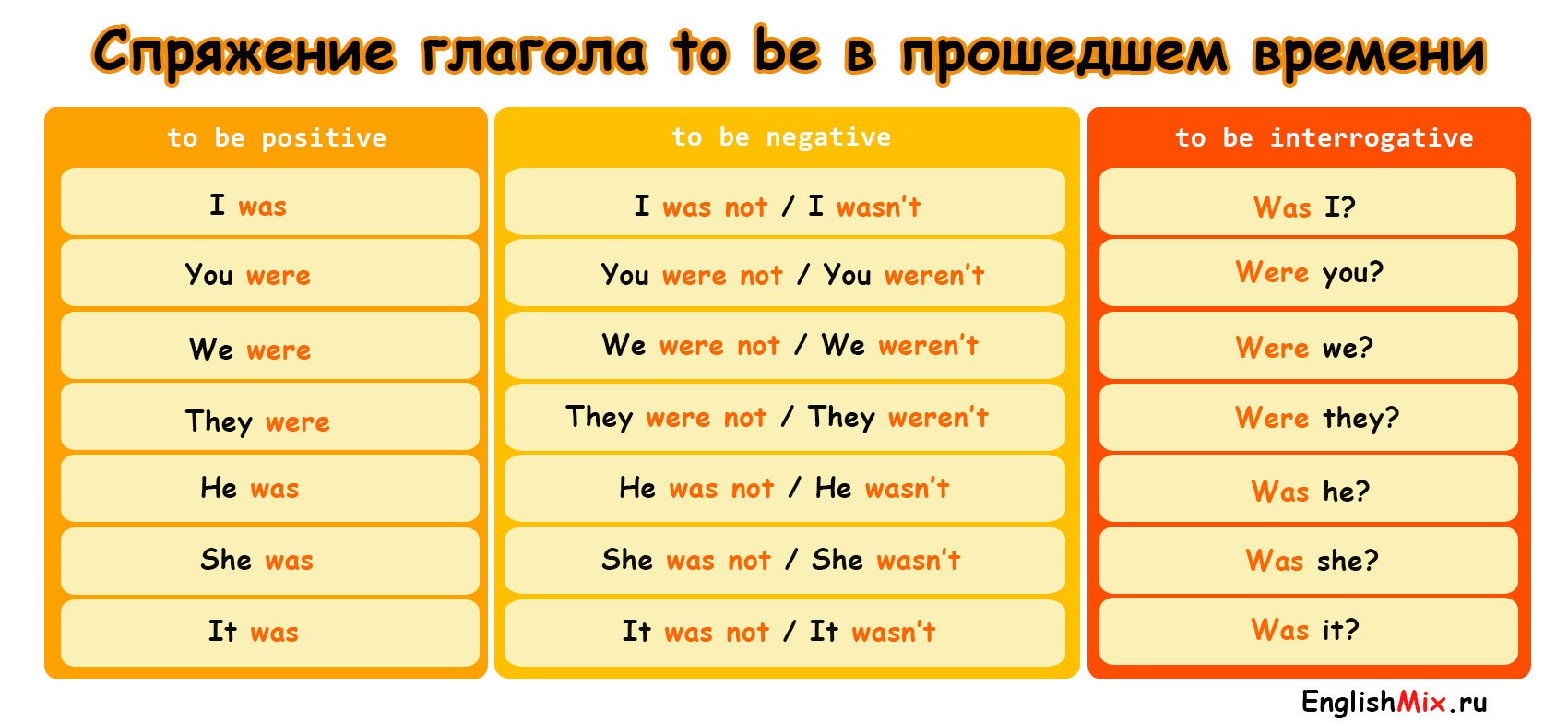
И чтобы выразить будущее время с глаголом to be нужно тоже правильно использовать его. Как видно на таблице он остается, как и в инфинитиве, то есть to be, только нужно после подлежащего добавить will.
p, blockquote 21,0,0,0,0 -->

А теперь посмотрим, как спрягается глагол to be во всех временах.
p, blockquote 22,1,0,0,0 -->

p, blockquote 23,0,0,0,0 -->
Примечание
p, blockquote 24,0,0,0,0 -->
to be в Present Continuous am/is/are being – это пассивный залог, вы можете перейти посылке и там же узнать подробней.
p, blockquote 25,0,0,0,0 -->
p, blockquote 26,0,0,0,0 -->
p, blockquote 27,0,0,0,0 -->
Точно также и в Past Continuous was being и так далее (and etc.).
p, blockquote 28,0,0,0,0 -->
p, blockquote 29,0,0,0,0 -->
Завершив с таблицей to be во всех временах и поняв его особенности, обязательно изучите, когда нужно использовать to be. Это вы можете узнать, не покидая нас, а все лишь перейти по ссылке to be в английском языке.
p, blockquote 30,0,0,0,0 -->
Глагол to have в английском языке во всех временах
Пришло время уделить внимание глаголу to have. Вы узнаете, как спрягается глагол to have во всех временах в английском языке. После изучения предлагаем вам, поближе познакомится с ним и узнать, как используется и что еще можно употребить вместо have. Все это в статье have и have got.
p, blockquote 31,0,0,0,0 -->
В английском языке существуют сокращения, которые очень часто употребляются в разговорной речи. Например, I’ve been, He’s got… etc.
p, blockquote 32,0,0,0,0 -->
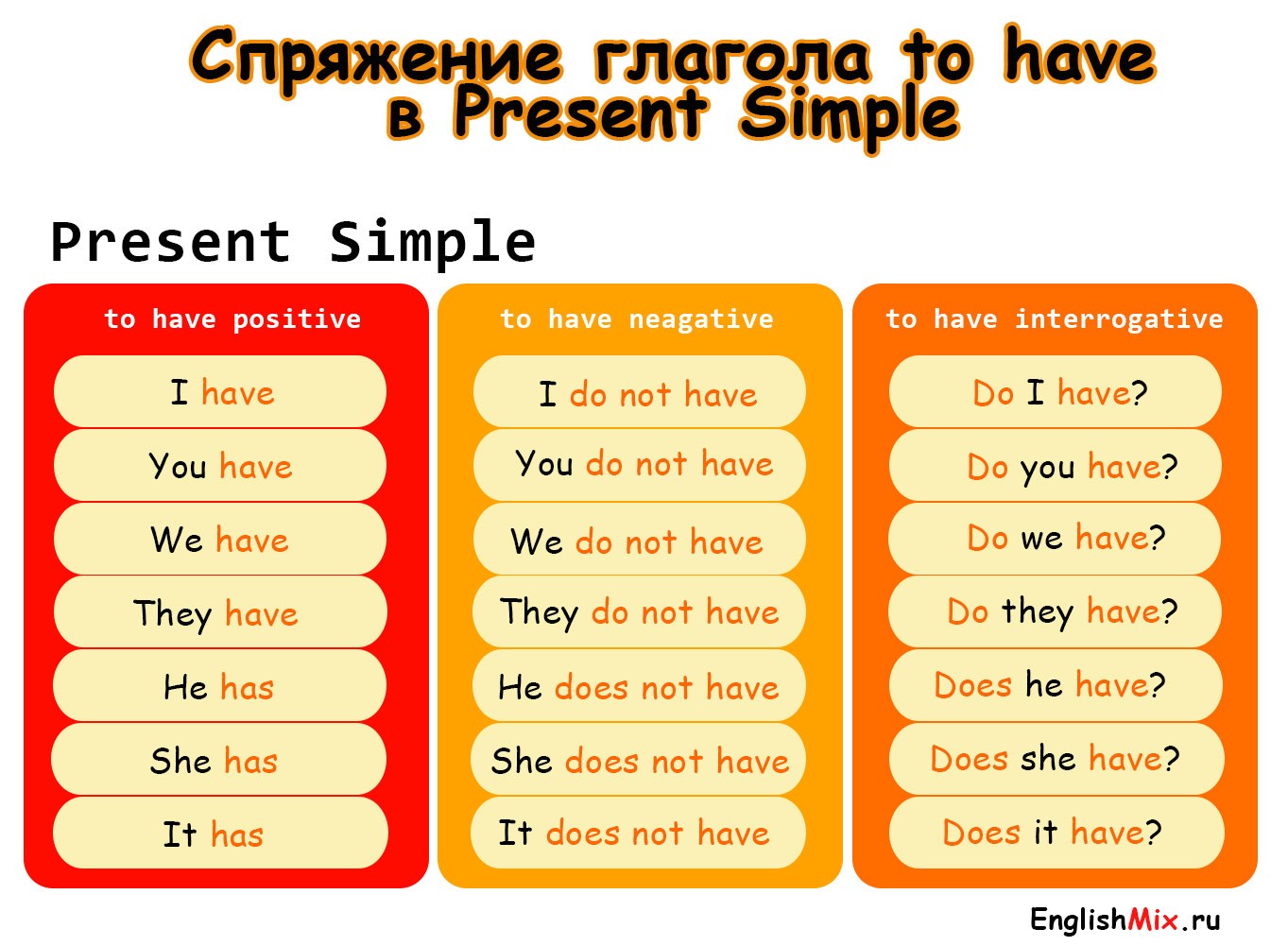
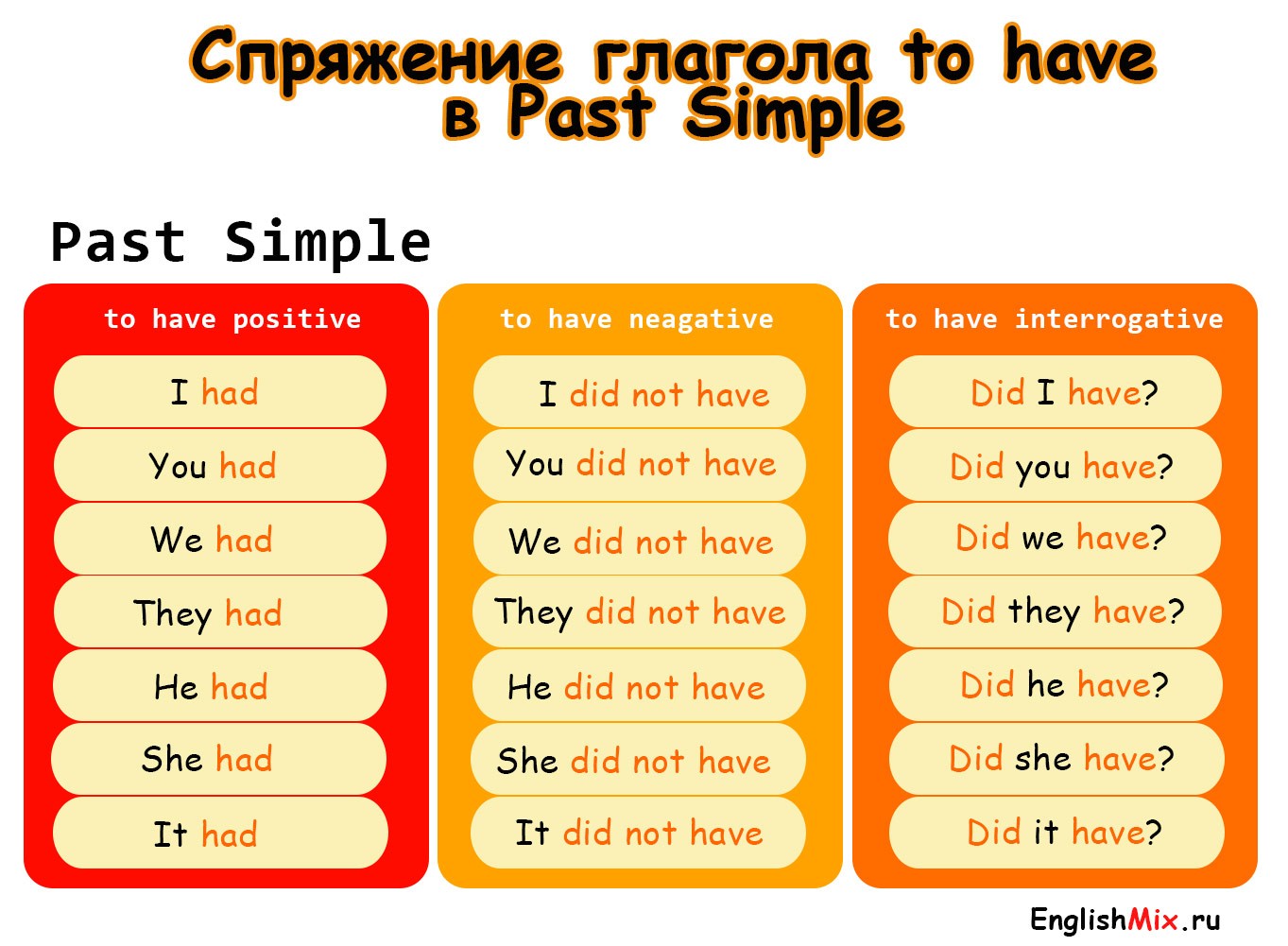
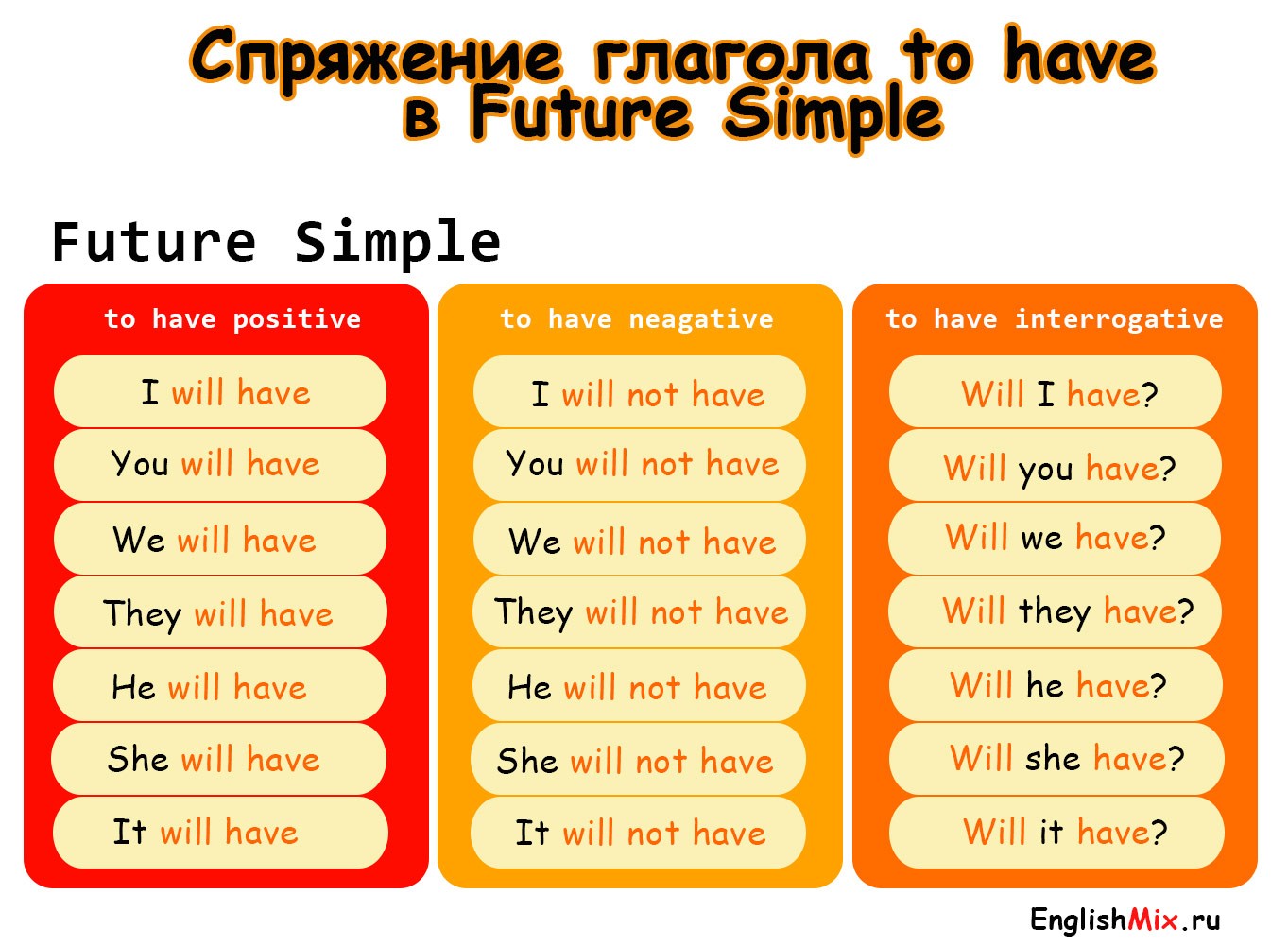
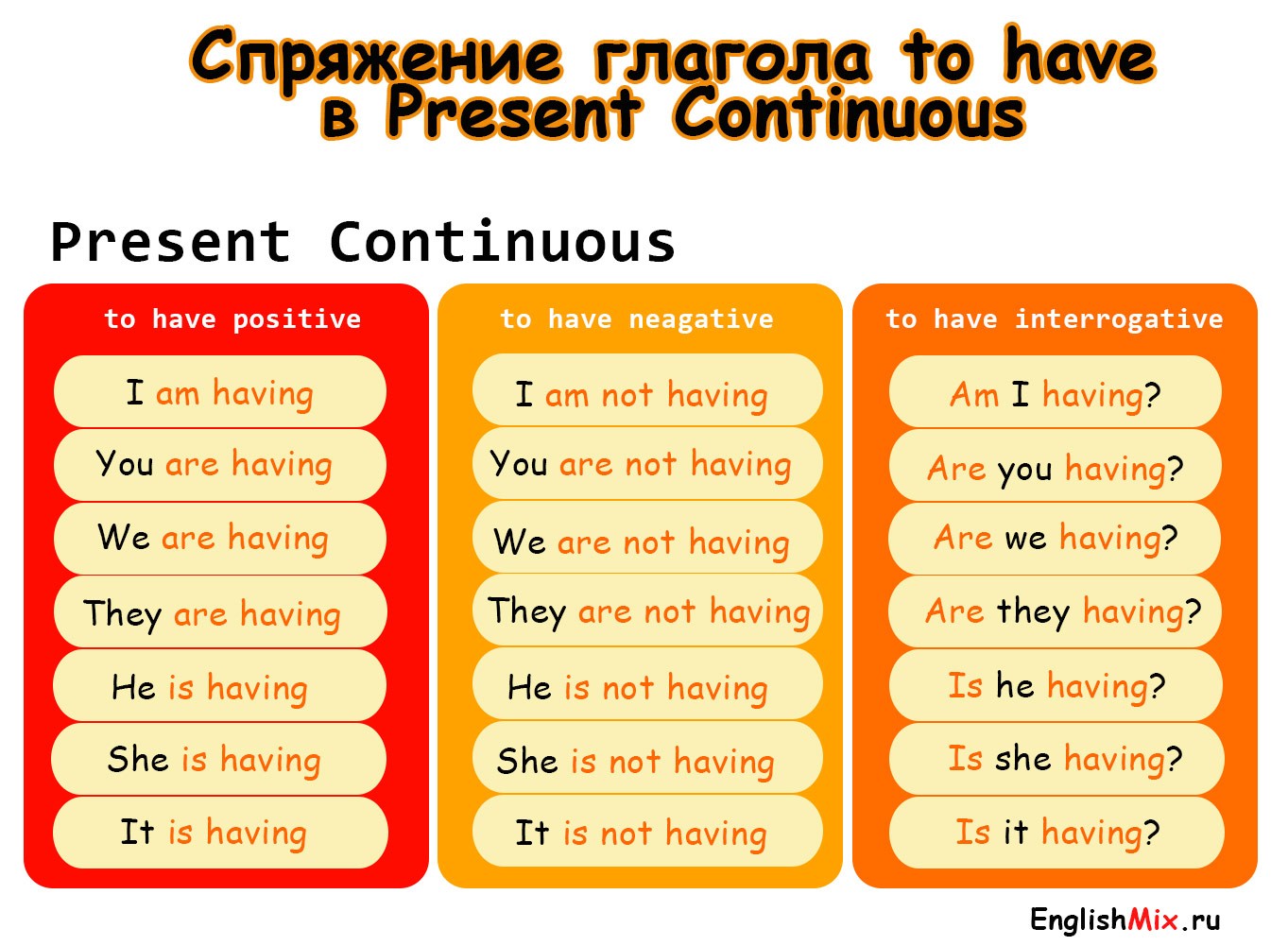


p, blockquote 33,0,0,1,0 -->
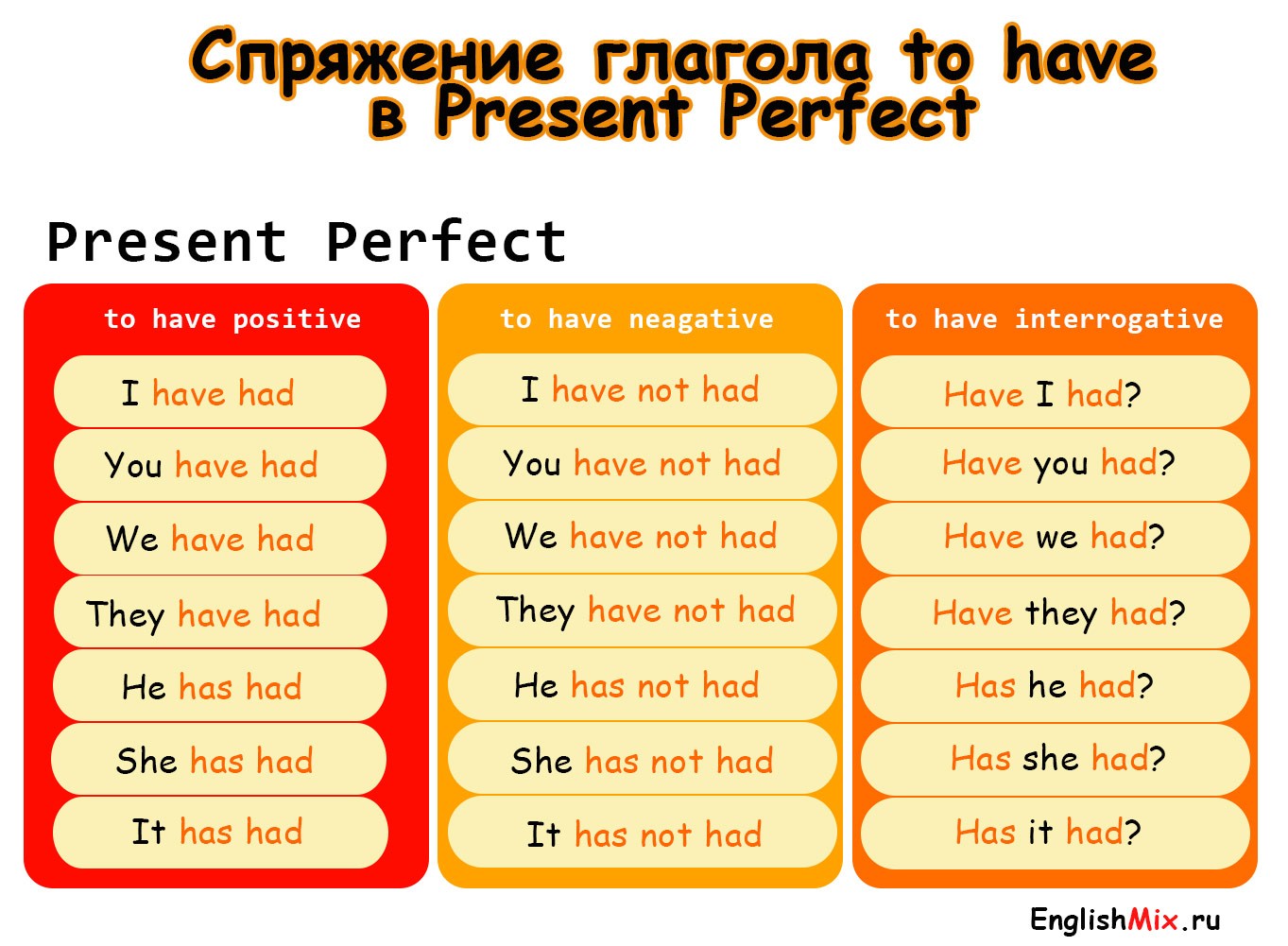

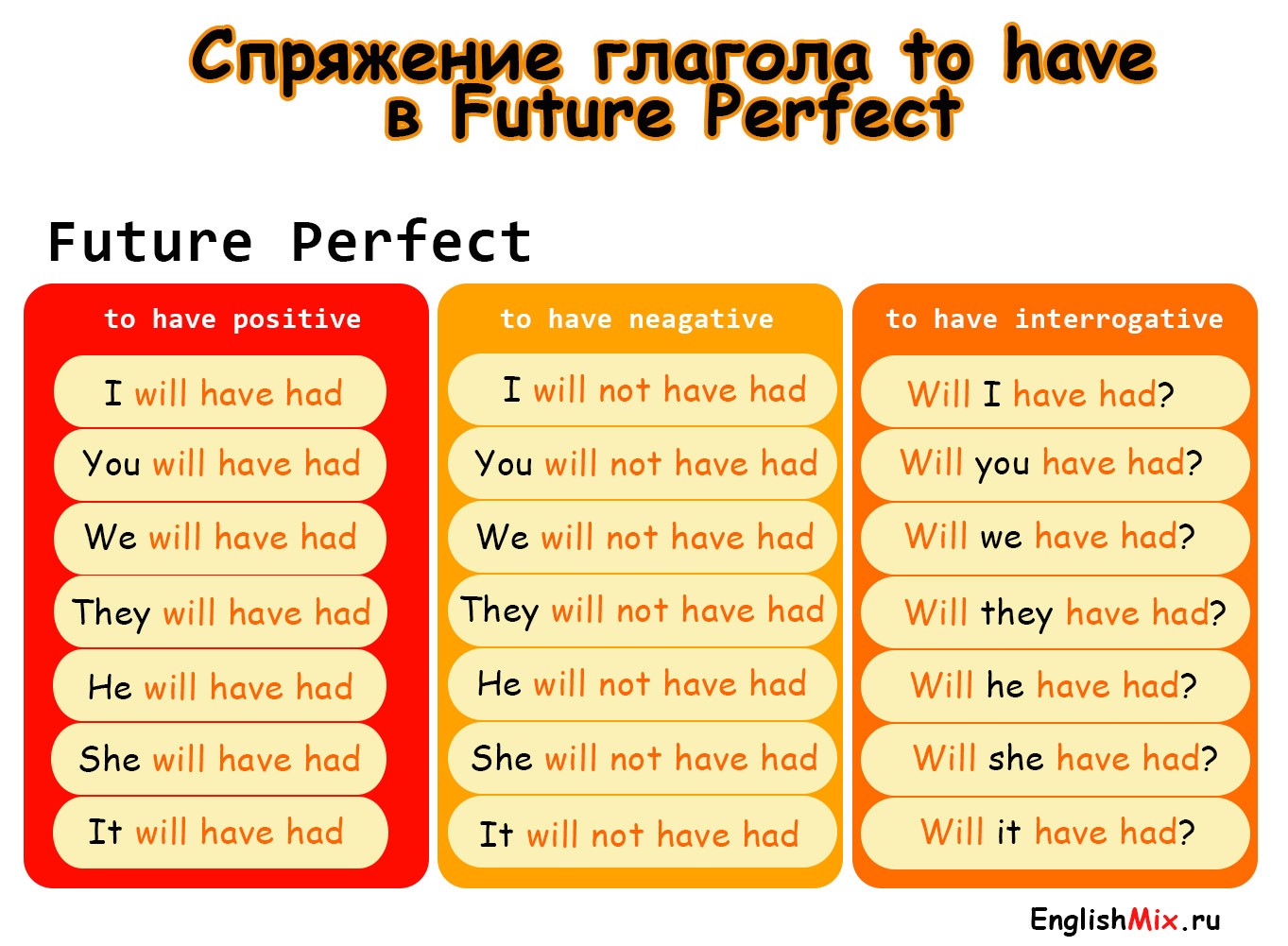
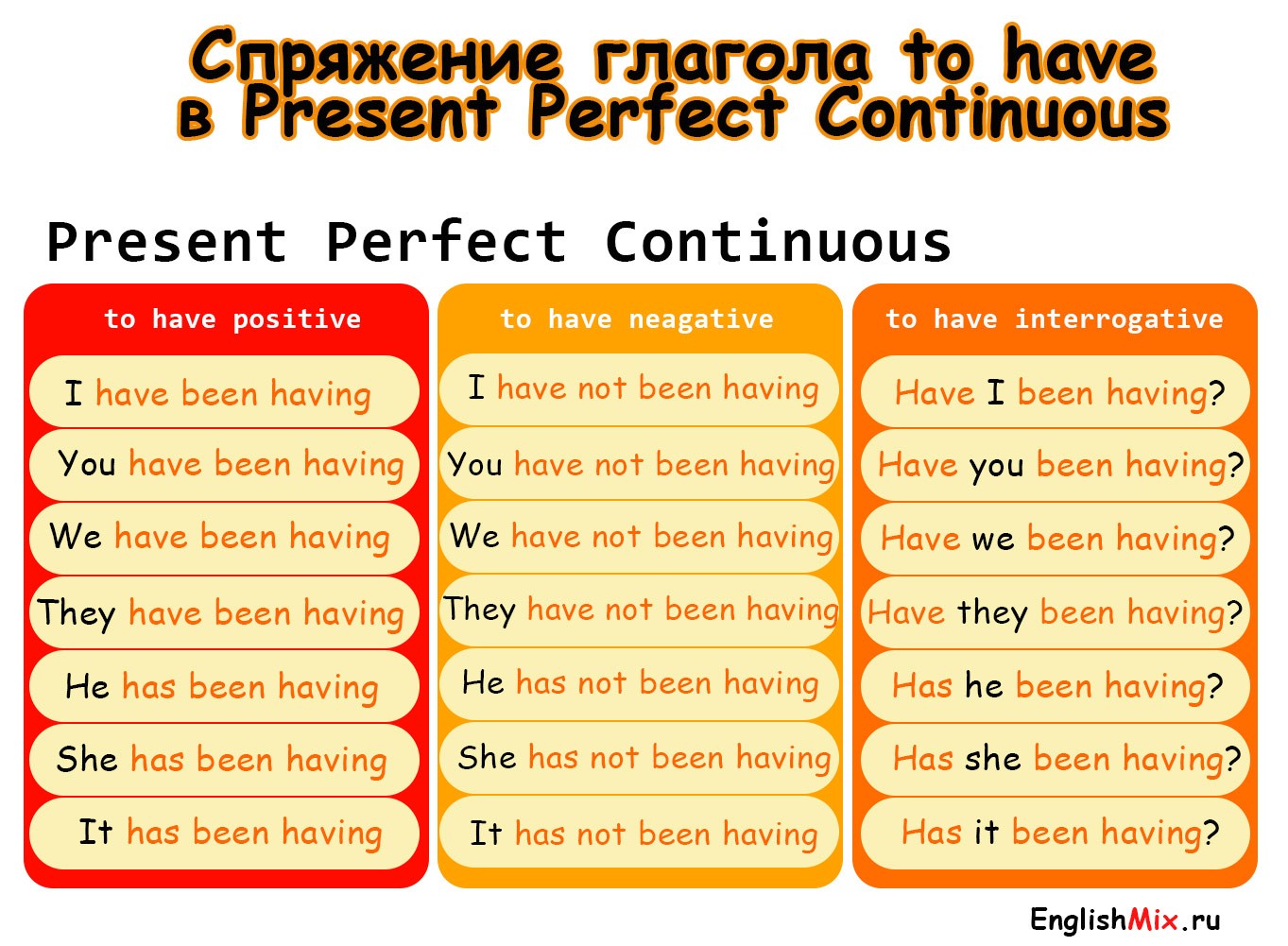

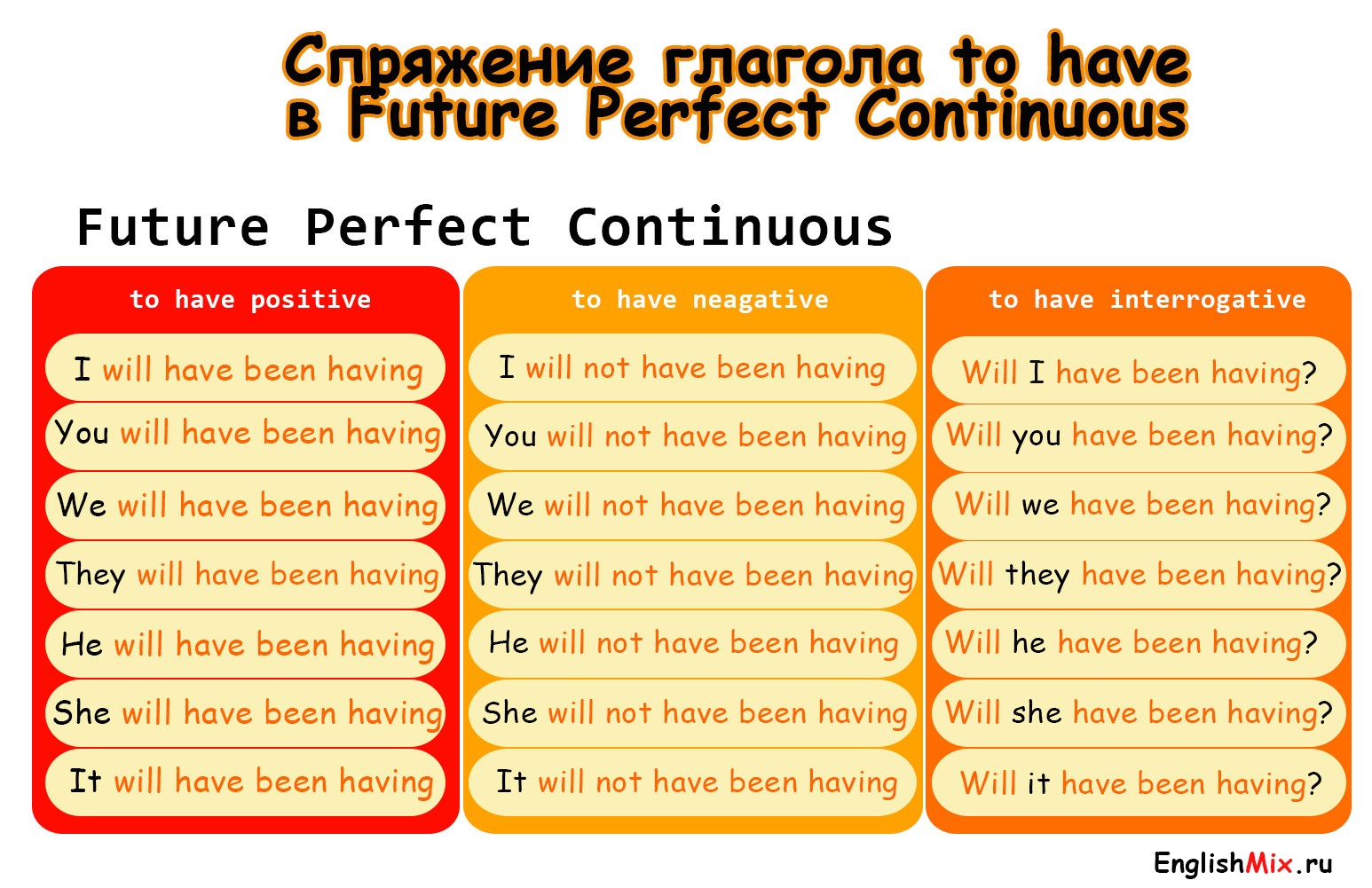
p, blockquote 34,0,0,0,0 -->
Прочтите несколько предложений с глаголами to be и to have
p, blockquote 35,0,0,0,0 -->
Здесь присутствует сокращенная форма name’s = is и I’m = I am.
p, blockquote 36,0,0,0,0 -->
p, blockquote 37,0,0,0,0 -->
Глагол to have в английском языке во всех временах примеры
Как выучить спряжение to be и to have
Одним словом, требуется время и практика. Прежде чем использовать какое-либо правило нужно знать определенное количество слов. Зная грамматику, но, не зная слова, вряд ли вы сможете построить предложения. Учите легкие слова и стройте с ними предложения.
p, blockquote 38,0,0,0,0 -->
Чтобы вам помочь, скачайте текст ниже, прочитайте его несколько раз, обратите внимание, как употребляется to be, попробуйте перевести его и затем пересказать. Внутри вас ждет небольшое пояснение к тексту и словарь, а также вопросы и небольшие задания после текста.
Глаголы to be и to have в английском языке встречаются часто, поэтому будьте внимательны, они используются либо как вспомогательный, либо как основной. Научитесь отличать разницу, чтобы в дальнейшем было понятно, как правильно переводить предложения. А теперь пройдите тест по английскому на глагол to be и to have. Хотим напомнить, что формы глагола to be и to have got можно тщательно изучить отдельно, нажав на один из глаголов.
p, blockquote 40,0,0,0,0 -->
Глагол to be и to have в английском языке упражнения
В тесте вам нужно будет поставить глаголы to be to have в нужной форме или в нужную временную форму, а также определить их функции.
p, blockquote 41,0,0,0,0 -->
p, blockquote 42,0,0,0,0 -->
p, blockquote 43,0,0,0,0 -->
p, blockquote 44,0,0,0,1 -->
Если вы нашли ошибку, пожалуйста, выделите фрагмент текста и нажмите Ctrl+Enter.
Читайте также:

